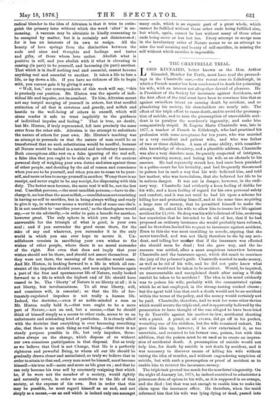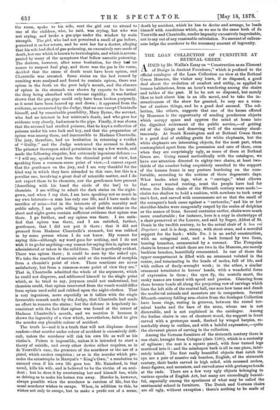THE CHANTRELLE TRIAL.
LORD KINNAIRD, better known as the Hon. Arthur Kinnaird, Member for Perth, must have read the proceed- ings in the Chantrelle case,—tho recent case in Edinburgh, in which a French master has been condemned to death for poisoning his wife, with an interest not altogether devoid of pleasure. He is President of the Society for insurance against Accidents, and the first effect of the trial must have been to convince him that as against swindlers intent on causing death by accident, and so plundering his society, his shareholders are nearly safe. The effect of the triple effort to cause death, and to avoid the presump- tion of suicide, and to raise the presumption of unavoidable acci- dent is to paralyse the murderer's ingenuity, and make him comparatively stupid. M. Eugene Marie Chantrelle was, late in 1877, a teacher of French in Edinburgh, who had practised his profession with some acceptance for ten years, who was married to a very excellent and patient wife, and who was father of two or three children. A man of some ability, with consider- able knowledge of chemistry, and a plausible address, Chantrelle was also a very dissolute man, frequently suspected of intrigues, always wanting money, and hating his wife as an obstacle to his amours. He had repeatedly struck her, had once been punished in a police-court for his brutality, and had frequently threatened to poison her in such a way that his wife believed him, and told her mother, who was incredulous, that she believed her life to be in serious danger. It was not in danger, however, in the ordi- nary way. Chantrelle had evidently a keen feeling of dislike for his wife, and a keen feeling of regard for his own personal safety and comfort, and it was not until he had hit upon a scheme for killing her and protecting himself, and at the same time acquiring a large sum of money, that be permitted himself to make the attempt. He asked his wife to allow him to insure her life against accident for £1,000. So deep was his wife's distrust of him, so strong her conviction that he intended to be rid of her, that if he had proposed an ordinary insurance she would probably have refused, and he therefore limited his request to insurance against accident. Even to this she was most unwilling to accede, arguing that she never travelled, and was not likely therefore to die by any acci- dent, and telling her =Aker that if the insurance was effected she should soon be dead ; but she gave way, and the in- surance was settled, after a most suspicious interview between Chantrelle and the insurance agent, which did much to convince the jury of the prisoner's guilt. Chantrelle wanted to make money, as well as be rid of his wife, and he did not quite know what would or would not be taken to be accident. Would, he inquired, an unaccountable and unexplained death after eating a Welsh rarebit be taken to be accident? The idea in his mind evidently was to poison his wife, probably with the concentrated opium which he at last employed, in the strong-tasting cooked cheese ; but the agent told him that such a death would not bean accident within the terms of the policy, and the money would certainly not be paid. Chantrelle, therefore, had to seek for some other device which would secure the triple end, and is apparently believed by the prosecution to have thought of the one alleged to have been tried by de Tourville against his mother-in-law, accidental shooting with a pistol A pistol, at all events, did go off in his pocket, wounding one of his children, but the wife remained unhurt. He gave this idea up, however, if he ever entertained it, as boo uncertain, and recurred to his former one, poison, but with this addition, that the poison must be so used as to create an impres- sion of accidental death. A presumption of suicide would not help him, for death by suicide is not death by accident, and it was necessary to discover means of killing his wife without raising the idea of murder, and without engendering suspicion of suicide, but with such a presumption or proof of accident as to enable him to recover the insurance-money.
The triple task proved too much for the murdereesingenuity. On the night of January 1st, 1878, he indeed contrived to administer a poisonous dose of opium to his wife, as it is supposed in an orange, and she died ; but that was not enough to enable him to make his claim upon the insurance office. He therefore, when the maid informed him that his wife was lying dying or dead, passed into the room, spoke to his wife, sent the girl out to attend to one of the children, who, he said, was crying, but who was not crying, and broke a gas-pipe under the window by main strength. The girl, who had not perceived a smell of gas before, perceived it on her return, and he sent her for a doctor, alleging that his wife had died of gas-poisoning, an excessively rare mode of death, but one which is known to toxicologists, and which is accom- panied by many of the symptoms that follow narcotic poisoning.
The doctors, however, after some hesitation, for they had no reason to suspect foul play, and there was the gas in the room, decided that the cause of death must have been opium, and Chantrelle was arrested. Some stains on the bed caused by vomiting were analysed and found to contain opium, there was opium in the froth on the poor lady's mouth, and the absence of opium in the stomach was shown by experts to be usual, the drug being absorbed with extreme rapidity. It was further shown that the gas-pipe could only have been broken purposely, as it must have been heaved up and down ; it appeared from the evidence, as recounted by the Judge, that no one except Chantrelle himself, and by conceivable possibility, Mary Byrne, the servant, who had no interest in her mistress's death, and who gave her evidence very clearly, bad access to the pipe. Finally, it was shown that the accused had studied poisons, that he kept a collection of poisons under his own lock and key, and that the preparation of opium was among them, and inaccessible to Madame Chantrelle. The jury, therefore, had no hesitation in returning a verdict of "Guilty," and the Judge sentenced the accused to death. The prisoner thereupon asked permission to say a few words, and made the following singular, but extremely ingenious defence :— "I will say, speaking not from the chemical point of view, but speaking from a common-sense point of view,—I cannot expect that the gentlemen on the jury, and I am very thankful for the kind way in which they have attended to this case, but this is a peculiar one, involving a great deal of scientific matter, and I do not expect them to be chemists, nor the gentlemen here present [describing with his hand the circle of the bar] to be chemists. I am willing to admit the dark stains on the night- gown, and when I say that, I am here speaking not so much in my own interests—a man has only one life, and I have made the sacrifice of mine—but in the interests of public morality and public safety, I am quite willing to admit that the stains on the sheet and night-gown contain sufficient evidence that opium was there. I go further, and say opium was there. I am satis- fied that opium was there, and I am satisfied, further, gentlemen, that I did not put it there ; that it did not proceed from Madame Chantrelle's stomach, but was rubbed in by some person whom I do not know. My reason for saying this—although my word goes for nothing, and I do not wish it to go for anything—my reason for saying this is, opium was administered or taken in the solid form. That is perfectly evident. There was opium there ; it could be seen by the naked eye. We take the reaction of meconic acid or the reaction of morphia from a chemist's point of view. These reactions are never satisfactory, but from a common-sense point of view they are." That is, Chantrelle admitted the whole of the argument, which he could not disprove, and addressed himself to the single point which, as he tried to say, jurymen could not understand, but chemists could, that opium recovered from the vomit would differ from opium used solid and rubbed upon the night-clothes. That is very ingenious, more especially as it tallies with the single favourable remark made by the Judge, that Chantrelle had made no effort to remove the stains ; but the defence is hopelessly in- consistent with the fact that opium was found at the corner of Madame Chantrelle's mouth, and we mention it because it shows the ingenuity of a view which, nevertheless, failed to give the murder any plausible colour of accident.
The truth is—and it is a truth that will not displease decent readers—that murder under colour of accident is excessively diffi- cult, unless the murderer will risk his own life as well as his victim's. Poison is impossible, unless it is intended to start a theory of suicide, and every other device either requires, as in de Tourville's case, the presence of the murderer or the use of a pistol, which excites suspicion ; or as in the murder which pre- cedes the catastrophe in Marryat's "King's Own," a resolution to succeed even if his own life goes too. Mr. Rainsford, in that novel, kills his wife, and is believed to be the victim of an acci- dent; but he does it by overturning her and himself too, while so driving as to make his horses run away. Murder is, however, always possible when the murderer is careless of life, but the usual murderer wishes to escape. When, in addition to this, he ?rushes not only to escape, but to make a profit out of a scene, death by accident, which he has to devise and arrange, he loads himself with conditions which, as we see in the cases both of de Tourville and Chantrelle, render impunity excessively improbable, not to say out of any reasonable calculation. No amount of callous- ness helps the murderer to the necessary amount of ingenuity.



































 Previous page
Previous page